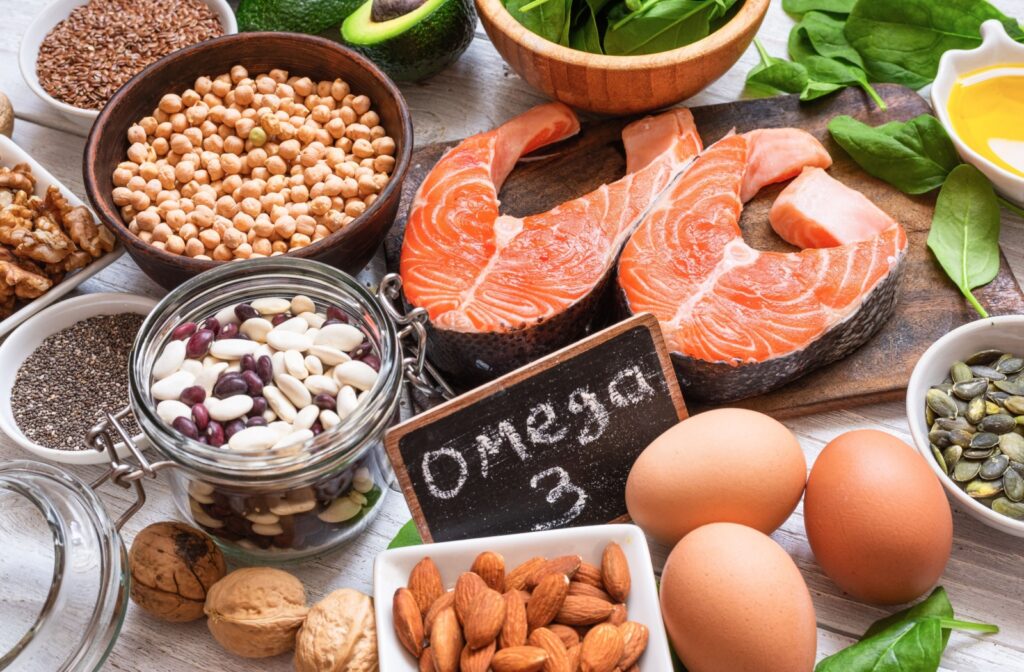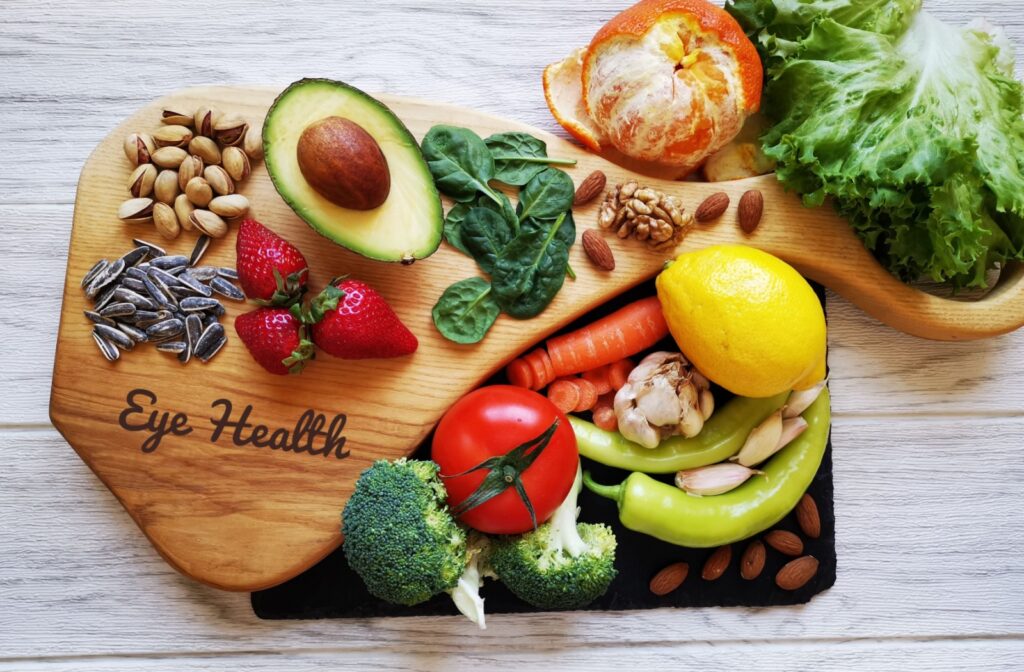Good nutrition is essential for overall health, but its impact on your eyes often gets overlooked. What you eat plays a crucial role in maintaining eye health, managing dry eyes, and potentially preventing or managing vision loss.
The best foods for vision loss include ones that are nutrient-rich and high in antioxidants, and some of the worst include high-sodium processed foods. However, that’s only the start. The choices you make at the table can support—or harm—your vision in the long term.
Nutrition and Your Eye Health
Your eyes are complex organs that require a variety of nutrients to function at their best. Specific vitamins, minerals, and antioxidants work together to protect your eyes and maintain their health. For example:
- Antioxidants like lutein and zeaxanthin filter harmful UV light and combat oxidative stress, helping to prevent conditions like macular degeneration.
- Omega-3 fatty acids support retinal health and can reduce the risk of dry eye syndrome.
- Vitamins C and E, along with zinc, help protect against cataracts and age-related macular degeneration (AMD).
Conversely, poor nutrition can have the opposite effect. Diets high in unhealthy fats, sugars, and processed ingredients can lead to chronic inflammation, increased oxidative stress, and higher risks of conditions like cataracts, macular degeneration, and diabetic retinopathy. Over time, these can lead to irreversible damage to your vision.
Best Foods for Vision Loss
To support your eye health, add these nutrient-rich foods to your diet:
Leafy Green Vegetables
Vegetables like spinach, kale, and collard greens are loaded with lutein and zeaxanthin, 2 key antioxidants that are concentrated in the retina. These nutrients help filter harmful light and protect against oxidative damage, reducing the risk of macular degeneration. Incorporate these greens into salads, smoothies, or sautéed dishes to pack your meals with vision-friendly benefits.
Fatty Fish
Salmon, tuna, mackerel, and other fatty fish are excellent sources of omega-3 fatty acids, which support retinal health and can help reduce chronic inflammation in the eyes. Some studies have linked diets rich in omega-3s with a lower risk of dry eye syndrome and macular degeneration. Other sources of omega-3 include walnuts, chia seeds, flaxseed, and soybeans.
Citrus Fruits
Oranges, lemons, grapefruits, and other citrus fruits are rich in vitamin C, a powerful antioxidant that helps protect the eyes against free radical damage. Vitamin C also plays a role in maintaining the health of blood vessels in the eyes. Snack on an orange or add some grapefruit to your breakfast to keep your eyes healthy.
Nuts & Seeds
Almonds, sunflower seeds, and chia seeds are all excellent sources of vitamin E, an antioxidant that protects eye cells from oxidative stress. Severe deficiency may increase your risk of retinal damage and vision loss. Just a small handful of almonds provides almost half of your daily recommended vitamin E intake. Sprinkle seeds onto yogurt or salads for an easy, nutritious boost.
Eggs
Eggs are a nutritional powerhouse for eye health, containing lutein, zeaxanthin, zinc, and vitamin A. These nutrients work together to protect the retina and help lower the risk of macular degeneration. Incorporate eggs into your morning scramble or dinner recipes to reap their benefits.

Worst Foods for Vision Loss
While some foods enhance vision, others can do more harm than good. Here’s what to avoid or consume sparingly for the sake of your eyes:
Processed Foods
High in unhealthy fats, sodium, and artificial additives, processed foods can contribute to chronic inflammation, which damages blood vessels, including those in your eyes. Over time, this increases the risk of conditions like diabetic retinopathy and AMD. Opt for whole, unprocessed foods whenever possible.
Sugary Drinks
Sugary sodas and energy drinks are major culprits in driving up blood sugar levels, which can lead to inflammation and even diabetes. Elevated blood sugar is a significant risk factor for diabetic retinopathy, a condition that damages the retina and may lead to vision loss. Hydrate with water or unsweetened beverages to support your overall health.
Fried Foods
Fried foods often contain trans fats, which are linked to oxidative stress and increased inflammation in the body. Both can accelerate the development of eye conditions like macular degeneration. Limit fried foods and choose baked or grilled options instead.
Excessive Alcohol
Overindulgence in alcohol can deplete essential vitamins and minerals, including B vitamins and vitamin A, which are critical for eye health. Over time, heavy alcohol consumption may contribute to optic nerve damage and speed up the development of AMD. Moderation here is key.
High Sodium Foods
Consuming excessive salt can lead to higher blood pressure, which affects the small, delicate blood vessels in your eyes. Over time, this can contribute to vision problems. Be mindful of hidden sodium in processed snacks, canned goods, and restaurant meals.
How to Incorporate Eye-Healthy Foods Into Your Diet
Taking steps to improve your diet doesn’t have to be difficult. Here are some simple tips to include more eye-healthy foods in your daily routine:
- Plan your meals so you can include a variety of colorful fruits and vegetables.
- Add leafy greens like spinach to smoothies or soups for a nutrient boost.
- Opt for grilled salmon or tuna to incorporate omega-3s into your meals at least twice a week.
- Snack on almonds, sunflower seeds, or a fresh orange instead of reaching for processed snacks.
- Experiment with egg-based dishes like frittatas or breakfast burritos to keep your meals exciting.
The Role of Supplements
While a balanced diet should be your primary source of nutrients, supplements may help fill in the gaps when needed. Some eye-friendly supplements include:
- Omega-3 fatty acids: Support retinal health and reduce inflammation.
- Lutein and zeaxanthin: Protect against UV light and oxidative stress.
- Zinc: Helps maintain retinal health.
Before adding any supplements to your routine, consult your eye care professional to determine what is best for your specific needs.
Strengthen Your Vision Through Nutrition
The old saying holds true: you really are what you eat! Nutrition is one of the most accessible, natural ways to support your eye health and prevent vision loss. Making smart, informed choices at mealtime can go a long way in keeping your vision sharp.
Take the next step toward better eye health by scheduling an appointment with Pack & Barnes Optometry today. Our knowledgeable team is here to guide you through lifestyle changes that can protect and improve your vision for years to come.



